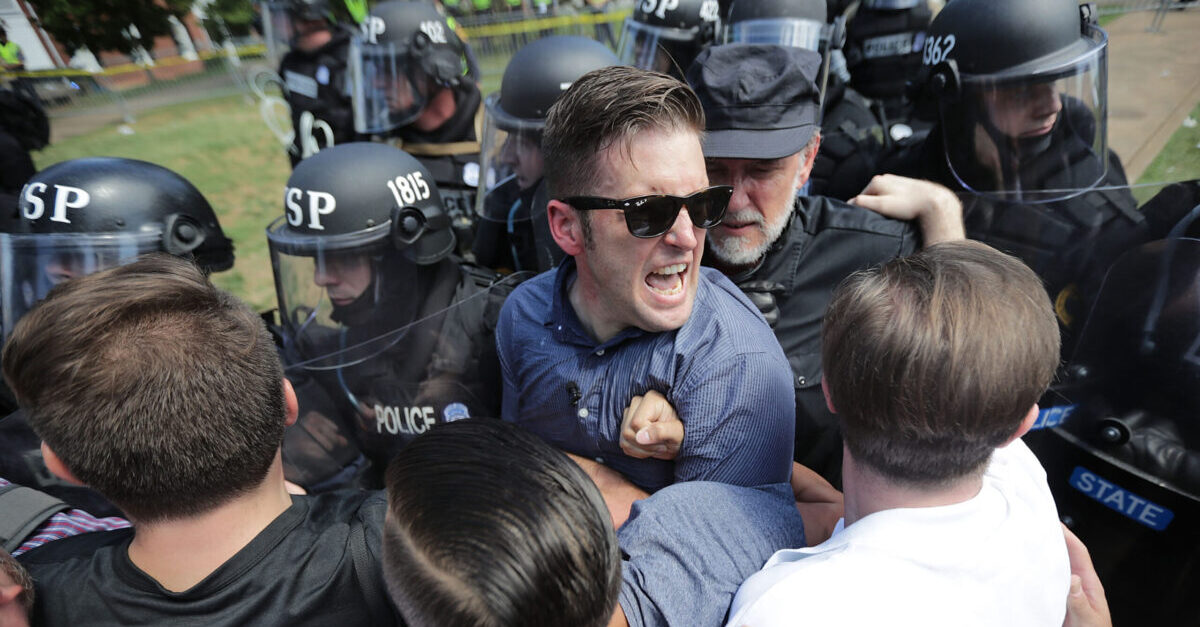
White nationalist Richard Spencer (center) and his supporters clash with Virginia State Police after the “Unite the Right” rally was declared an unlawful gathering August 12, 2017 in Charlottesville, Virginia.
White nationalist Richard Spencer’s financial woes have resulted in yet another legal professional dumping him as a client. That’s according to an order signed by a U.S. Magistrate Judge in the Western District of Virginia.
The order, by Magistrate Judge Joel C. Hoppe, allows attorney John DiNucci to withdraw from representing Spencer in a case which surrounds the 2017 Charlottesville, Va. “Unite the Right” rally.
Procedurally, here is how it happened, according to court records. DiNucci filed a motion May 15th asking the judge, under Local Rule 6(i) and for “good cause,” to (1) grant a motion for leave to withdraw; (2) to actually permit DiNucci to withdraw; and (3) to relieve DiNucci “of any further responsibility in” Spencer’s case.
Local Rule 6(i) states merely that “[n]o attorney of record shall withdraw from any cause pending in this Court, except with the consent of the Court for good cause shown.”
An eventual order granting DiNucci’s request says Spencer objected to his attorney’s attempt to leave him in the dust — even though he didn’t pay his legal bills — and even “asked for one additional week to develop a payment plan for his attorney’s approval.” DiNucci “informed the Court that he stands by his motion to withdraw as counsel.”
Other documents filed by the plaintiffs in the case shed more light on the issue. DiNucci said Spencer owed him a “substantial sum of money” and that DiNucci warned Spencer he would have to withdraw as early as January if the issues went unresolved. Spencer raised this in his defense: “in terms of my ability to raise money, I don’t think that can be put into question.” In other words, it seemed he wanted to crowdsource his legal fees.
Much of the fee dispute was not aired in public. Judge Hoppe merely granted DiNucci’s motion in a conclusory fashion: “the Court finds Mr. DiNucci has shown good cause to withdraw from representing Mr. Spencer in this matter.”
The court cited, among other things, Virginia Rule of Professional Conduct 1.16(b) in okaying the withdrawal. That rule allows an attorney to leave a case with a court’s permission for a series of reasons, including when “the client fails substantially to fulfill an obligation to the lawyer regarding the lawyer’s services and has been given reasonable warning that the lawyer will withdraw unless the obligation is fulfilled.” That rule also allows withdrawal when “the representation will result in an unreasonable financial burden on the lawyer or has been rendered unreasonably difficult by the client.”
The judge chided Spencer in a footnote for emailing the judge directly about his apparent financial woes: “The Court . . . disapproves of Mr. Spencer emailing documents, such as a brief in opposition, that should be filed with the Clerk’s Office. Moreover, the Court will not allow ex parte communications absent a properly filed motion requesting such relief.”
The judge further ordered that Spencer will be “solely responsible for conducting his defense in accordance with all rules, court orders, and deadlines” — unless he finds a new attorney — and that “[n]either the trial date nor any deadline will be continued because of the granting of the motion to withdraw.”
The plaintiffs in the case had previously filed their own documents in the case bringing to light Spencer’s other financial woes which resulted in an attorney ditching him in Montana.
“[A] court in Montana held Mr. Spencer in contempt for his persistent refusal to pay tens of thousands of dollars of court-ordered fees he owes to the Guardian ad Litem (the ‘GAL’) who represented his children in his recent divorce proceeding,” the plaintiffs wrote. “Indeed, while Mr. Spencer expressed optimism to Your Honor on June 11 regarding his ability to satisfy his financial obligations to Mr. DiNucci by raising money, Mr. Spencer took a decidedly different tack during the May contempt hearing in Montana: ‘Well, indigent is indigent,’ he told the Montana court. ‘I can’t invent money of out [sic] thin air'” (some internal punctuation removed).
Later in the documents filed by the plaintiff, it was revealed Spencer owed “more than $60,000” in the Montana case and that he was accused of saying he would “never, ever” pay the GAL.
At a Montana hearing quoted in the Virginia federal court records, Spencer said he had no money:
“Well, indigent is indigent,” he is quoted as saying in court. “I can’t invent money of out thin air.”
“Well, then what’s the point of filing a motion? I mean, I just – like if there’s no money to pay [the GAL] . . . . So this is all rather academic . . . I cannot afford a lawyer,” he is also quoted as saying.
Here’s more from the plaintiffs about Spencer’s financial dealings in Montana:
“The Montana Court gave Mr. Spencer one month to purge the contempt by paying or developing a payment plan to pay his outstanding fees to [the GAL]. The Montana Court further ordered that Mr. Spencer serve a 14-day jail sentence and pay a $500 fine should he fail to purge himself of the contempt. Mr. Spencer indicated that he would file a motion within fourteen days asserting that he is indigent. As far as Plaintiffs are aware, Mr. Spencer also has neither filed a motion in response to the OSC in the Montana Court nor purged himself of the contempt.”
Also attached are text messages from Spencer to the GAL.
The federal lawsuit in Virginia is one of several filed by victims of the Charlottesville violence.
Judge Allows Richard Spencer’s Attorney to Withdraw by Law&Crime on Scribd
[photo by Chip Somodevilla/Getty Images]